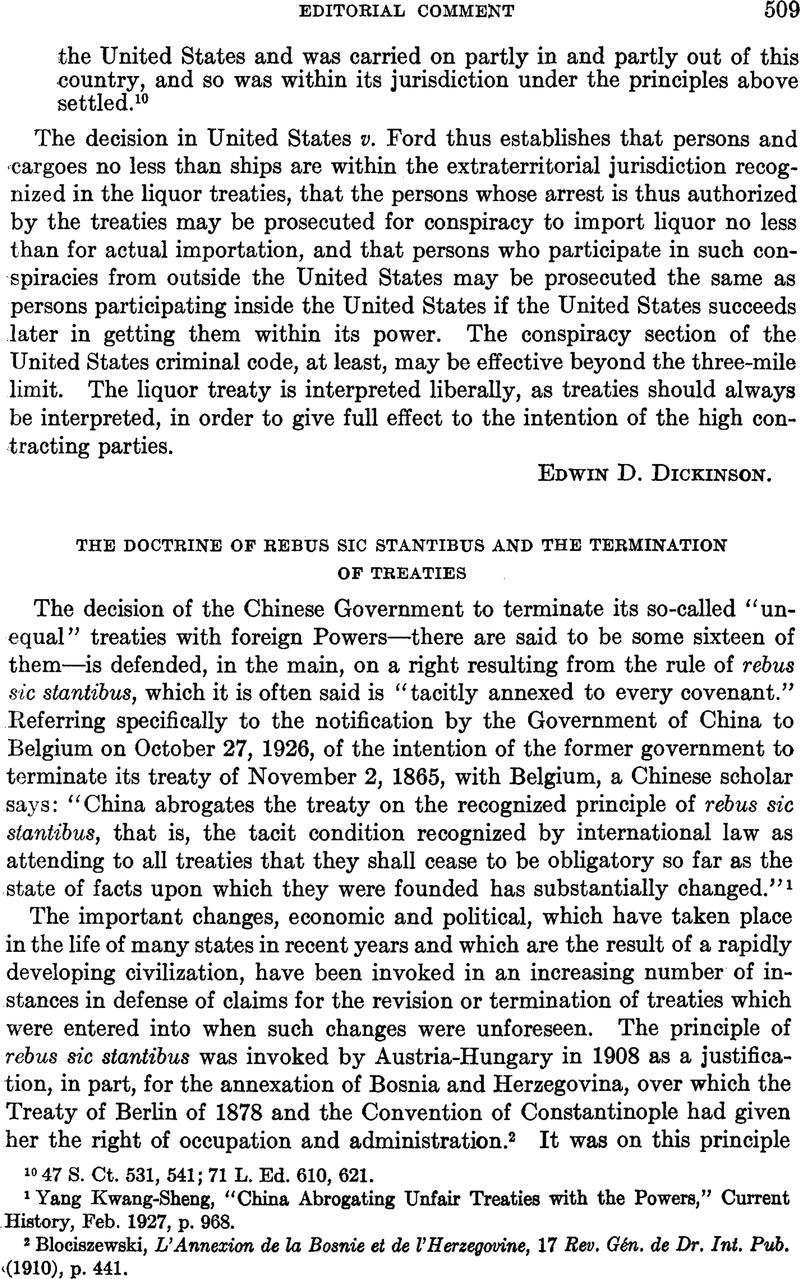Published online by Cambridge University Press: 04 May 2017

1 Kwang-Sheng, Yang China Abrogating Unfair Treaties with the Powers, 24 Current History, Feb. 968 (1927)Google Scholar
2 Blociszewski, LAnnexion de la Bosnie et de VHerzegovine, 17 Rev. Gen. de Dr. Int. Pub. (1910), p. 441.
3 Scelle, 20 ibid. (1913), pp. 484 jf
4 Pauchille, Traitt de Droit International Public, 1.1, troisime partie (1926), p. 386.
5 See Art. 435 of the Treaty of Versailles
6 Rev. de Dr. Int. et de L6g. Comparie, 2nd ser., t. II, p. 106.
7 Ibid., 2nd ser., t. VI, p. 299.
8 Fauchille, op. cit., p. 388.
9 Since unanimity is required to advise the reconsideration of treaties, and since fifty-six States are now represented in the Assembly, that body is not well fitted for the exercise of such a function. Manifestly the Council, or still more, the Permanent Court of International Justice, might more appropriately have been entrusted with it.
10 Lammasch (Das Vdlkerrecht Nach dem Kriege, 1917, pp. 142 ff.) denied that it was a rule of international law, and so did Bruno Schmidt in his monograph Ober die Volkerrechtliche Clausula rebus sic stantibus (1907).
11 Compare G. F. von Martens, Law of Nations (Cobbett trans. 4th ed.), p. 352; Oppenheim, International Law (3rd ed.), Vol. I, p. 692; Kluber, Europaisches Vdlkerrecht, sec.165; Gessner, in Holtzendorf, Handbuch des Volkerrechts, Bd. I l l , S. 80; JeUinek, Die rechtliche
12 International Law (2nd ed.), Vol. II, p. 109. Hall (International Law, 3rd ed., 351') thus states the principle: Neither party to a contract can make its binding effect dependent, at his will upon conditions other than those contemplated at the moment when the contract was entered into, and on the other hand, a contract ceases to be binding so soon as anything which formed an implied condition of its obligatory force at the time of its conclusion is essentially altered
13 Digest of International Law of the United States, Vol. II, sec. 137a. Pradier-Fod maintained that treaties ceased to be binding when there had been an essential modification of the circumstances in view of which the treaty had been concluded. Droit Int. Pvb., t. II, pp. 927 ff. Rolin-Jaequemyns says the new circumstances on which the doctrine of rebus sic stantibus is based are only those which make the execution of the treaty materially or morally impossible or which deprive one party of the advantageswhich the treaty intended to confer. Rev. de Droit Int. et de L4g. Comp., t. 19, p. 46.
14 VdlherrecM, sec. 98.
15 Nouv. Droit Int. Pub., 1.1, p. 466.
16 Jellinek, op. tit., pp, 62 ff. and Bluntschli, Droit Int. Cod., secs. 415, 460
17 “ Politics” (Eng. trans. by Dugdale and Torben de Bille), Vol. I, pp. 29, 96.
18 See Fuehr, The Neutrality of Belgium, Chs. IV, VII; Hampe in Modem Germany (Eng. trans. of a work entitled Deutschland und der Weltkrieg), p. 363; Schoenborn, ibid., p. 545; and Burgess, The European War of 1914—Its Causes, Purposes and Probable Results, p. 171.
19 Most of the so-called “ unequal” treaties to which China is a party contain a clause to the effect that either party may demand a revision of the treaty as a whole, or of the tariff and commercial provisions, at the end of every ten years. The treaty with Belgium, however, differs from the others in that, apparently, it gives Belgium alone the right to demand revision.
20 This appears to have been the view of Heffter, Fiore, Treitschke, Jellinek, Pradier-Fod6, and perhaps Bluntschli.
21 The U. S. Court of Claims held that the United States was justifiedin annulling by legislative act in 1798 the treaty of 1778 with France, partly because of changed conditions, bt more especially because of infractions of the treaty on the part of France. The Brig William and Hooper v. United States 22, C. Cls. 201, 408. Generally, where states have denounced treaties in the absence of treaty right, they have justified their action upon other grounds than mere change of conditions, such, for example, as prior breaches by the other party. Compare Crandall, Treaties, Their Making and Enforcement (2nd ed.), p. 442.
22 Compare as to this Oppenheim, op. cit., Vol. I, p. 692; Westlake, in Rev. de Droit Int. et de Leg. ComparAe, 1901, p. 394; Fauchille, op. cit., t. I, pt. 3, p. 384; Scelle, 20 Rev. Gen. (1913), p. 499; Winfield, 7th ed. of Lawrence Prins. of Int. Law, p. 306; Bonfils, Droit International, sec. 857; and Blociszewski, 17 Rev. Gin., p. 441.
23 For. Reis. 1881, p. 554, and Moore, Digest, Vol. I l l , pp. 189 ff. In a memorandum addressed to the President in 1896 Secretary Olney, after reviewing the declarations of Mr. Blaine and Mr. Frelinghuysen, said: “ If changed conditions now make stipulations which were once deemed advantageous, either inapplicable or injurious, the true remedy is not in ingenious attempts to deny the existence of the treaty or to explain away its provisions, but in a direct and straightforward application to Great Britain for a reconsideration of the whole matter.” Moore, Digest, Vol. I l l , p. 202. A committee of the Senate, however, reported that in its opinion the treaty was obsolete and that the United States was under no obligation to be bound by it. Foster, Practice of Diplomacy, p. 304.
24 Compare Scelle, 20 Rev. Gin., p. 490, who remarkB that in such a case the complaining state ought first to endeavor to come to an agreement with its co-signatories, but if it cannot convince them that the principle of rebus sic stantibus requires a modification of the treaty, it is no longer bound to consider the treaty as binding upon it and it may therefore denounce it.